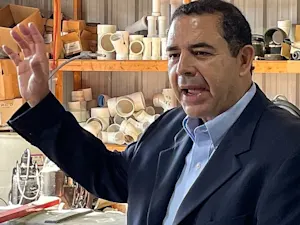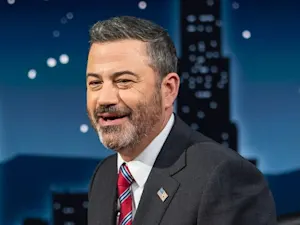
Bill Seeks Pardon for Hillary
Donald Trump with Bill Clinton at Trump Tower in 2000. Photo courtesy of Ralph Alswang, Office of the President — Clinton Presidential Library. Public domain.
The political landscape is bracing for turbulence as former President Donald Trump prepares for a second term, fueling a preemptive scramble for legal protections among prominent figures. At the center of this discussion is former President Bill Clinton, who has indicated he would be open to a conversation with President Joe Biden about a preemptive pardon for his wife, former Secretary of State Hillary Clinton. The mere suggestion has sparked debates about the use of presidential pardon power, the concept of political retribution, and what these moves might mean for the broader political system.
As Biden's team reportedly weighs blanket pardons for individuals potentially targeted under a second Trump administration, the Clintons' situation serves as a powerful case study of how unprecedented political machinations are reshaping the use of this constitutional power.
 Former U.S. President Bill Clinton and former Secretary of State Hillary Rodham Clinton at the 58th Presidential Inauguration in Washington, D.C., Jan. 20, 2017. Photo courtesy of U.S. Air Force Staff Sgt. Marianique Santos. Public domain.
Former U.S. President Bill Clinton and former Secretary of State Hillary Rodham Clinton at the 58th Presidential Inauguration in Washington, D.C., Jan. 20, 2017. Photo courtesy of U.S. Air Force Staff Sgt. Marianique Santos. Public domain.
Bill Clinton Speaks Out
The conversation began when Bill Clinton appeared on ABC's "The View." During the interview, host Sunny Hostin pressed Clinton on whether Biden should consider preemptive pardons for possible targets of the Trump administration, specifically Hillary Clinton. "I think if President Biden wanted to talk to me about that, I will talk to him about it," Clinton responded, as reported by The Hill, adding that the pardon power is "a very personal thing."
Clinton's comments reflect the unease surrounding Trump's openly stated intentions to pursue retribution against political opponents. In recent months, reports have emerged that Trump's allies, including his FBI director nominee Kash Patel, have compiled so-called "enemy lists" of individuals they plan to investigate or prosecute. Hillary Clinton's name features prominently on those lists, reviving debates over the investigation into her use of a private email server during her tenure as Secretary of State.
In defending his wife, Bill Clinton emphasized that multiple investigations, including one by Trump's own State Department, found no evidence of criminal wrongdoing. "They've got a problem with her because first, she didn't do anything wrong. Second, she followed the rules exactly as they were written," he said, as reported by The Hill.
The Context: A Second Trump Term and Political Retribution
The specter of political payback has increasingly dominated discussions as Trump's return to power approaches. On the campaign trail, Trump has made no secret of his plans to target critics, promising "retribution" and elevating officials who share his views, as reported by the Associated Press. His allies, such as Patel, have publicly vowed to pursue investigations of figures like Hillary Clinton, Dr. Anthony Fauci, and members of Congress who participated in the January 6 Committee.
The idea of preemptive pardons is not new, but it is rarely used in American politics. The most notable historical example occurred in 1974, when President Gerald Ford preemptively pardoned Richard Nixon following the Watergate scandal. Ford argued that the pardon was necessary to heal the country and prevent a prolonged, divisive trial. However, issuing pardons for individuals who have neither been charged nor convicted, as Biden is reportedly considering, would represent a significant departure from precedent.
 President Joe Biden signs H.R. 335 into law, Jan. 22, 2021. Photo courtesy of the White House. Public domain.
President Joe Biden signs H.R. 335 into law, Jan. 22, 2021. Photo courtesy of the White House. Public domain.
Biden's Dilemma
According to reports, Biden and his senior aides are deeply divided on the issue of preemptive pardons. White House lawyers have been quietly exploring the legal and political implications of using the pardon power in such a broad, anticipatory fashion. Biden's team fears that Trump's allies could launch costly and reputationally damaging investigations into public officials and allies, even if those inquiries ultimately lead to no charges.
For Biden, the stakes are high. Issuing preemptive pardons could signal impropriety, potentially undermining the reputations of those he seeks to protect. At the same time, the White House worries that failing to act could expose political allies to vindictive investigations. The Clintons' situation epitomizes this dilemma: a preemptive pardon could be viewed as an admission of guilt, despite Bill Clinton's insistence that Hillary did nothing wrong.
Some Democrats argue that preemptive pardons are necessary to prevent the misuse of government institutions for political revenge. Senator Ed Markey has cited Ford's pardon of Nixon as a precedent, urging Biden to consider a similar approach if Trump's intentions become clear. "If it's clear by January 19 that revenge is his intention, then I would recommend to President Biden that he provide those preemptive pardons," Markey said, as reported by POLITICO.
The Public Response
The suggestion of preemptive pardons has sparked mixed reactions from politicians and the public. Critics argue that granting pardons to individuals who have not been charged undermines the rule of law and sets a dangerous precedent. Representative Adam Schiff, a frequent target of Trump's criticism, expressed concern, saying, "I think it would seem defensive and unnecessary," as reported by POLITICO.
Others view the potential pardons as a necessary safeguard in an increasingly polarized political environment. Richard Painter, a former ethics lawyer under President George W. Bush, reluctantly supports the idea, noting that the alternative could be worse. "It's not an ideal situation at all," Painter said, adding "we have a whole lot of bad options confronting us at this point," as reported by the Associated Press.
What Comes Next?
As Biden weighs his options, the Clintons' case highlights the broader uncertainty surrounding Trump's return to office. Will Biden issue preemptive pardons, and if so, who will receive them? The answers to these questions could set a precedent for how future administrations approach political potential retribution and the pardon power.
For now, Bill Clinton remains noncommittal, emphasizing that any decision rests with President Biden. "I hope he won't do that," Clinton said, referencing Trump's alleged plans for retribution, adding "It's normally a fool's errand. You spend a lot of time trying to get even," as reported by ABC News.
Whether Biden acts or refrains, the political and legal fallout will be felt long after the decision is made.
References: Bill Clinton says he's open to talking to Biden about preemptive pardon for Hillary Clinton | 'The View': Bill Clinton Says He'd Talk to Biden About a Preemptive Hillary Pardon | Video | Biden White House Is Discussing Preemptive Pardons for Those in Trump's Crosshairs | Biden is considering preemptive pardons for officials and allies before Trump takes office | Bill Clinton indicates he hopes Biden doesn't issue preemptive pardons. | Will Joe Biden Pardon Hillary Clinton? Bill Clinton Weighs In























